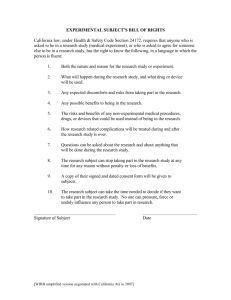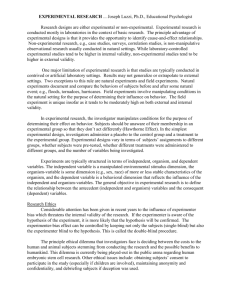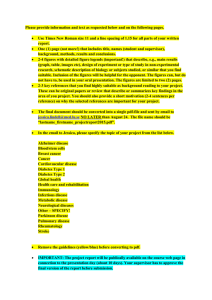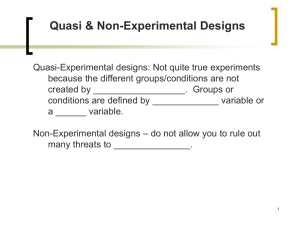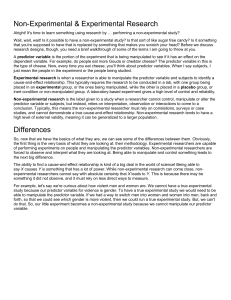Sex Research: Methods and Problems
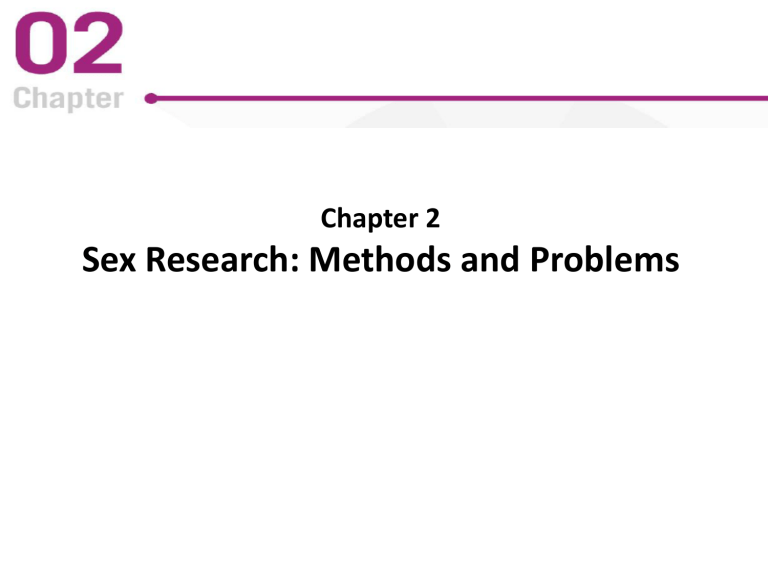
Chapter 2
Sex Research: Methods and Problems
Goals of Sexology
• The study of sexuality
• Goal is to:
– Understand sexual behavior
– Predict sexual behavior
– Control / Influence sexual behavior
• Ethical considerations when controlling behavior
Is applying research findings to control or modify behavior a legitimate aim of sex research?
A Summary of Research Methods
Non-Experimental Research Methods:
Case Studies
• Single subject or small group
– Each studied individually and in depth
• Data gathered using:
– Direct observation
– Questionnaires
– Testing
– Experimentation
Non-experimental Research Methods:
Case Study
• Advantages:
– In depth explorations
– Flexibility in data gathering procedures
• Disadvantages :
– Hard to generalize results
– Often based on retrospective self-report
– Not suitable for many research questions
Non-experimental Research Methods:
Survey Methods
• Small to large samples of people
• Data gathered using:
– Face-to-face interviews
– Questionnaires
• Can be computerized or distributed online
Choosing the sample
• Representative sample
• Random sample
Non-experimental Research Methods:
Survey Methods
• Advantages:
– Questionnaires : anonymity may improve honesty, cheaper
– Interviews : more flexible, rapport, may improve clarity & understanding
• Disadvantages:
– Non-response
– Demographic bias
– Inaccurate information
Non-experimental Research Methods:
Survey Methods
• Examples:
– The Kinsey Reports
– The National Health and Social Life Survey
– The National Survey of Sexual Health and Behavior
– The Youth Risk Behavior Survey
– Violent Pornography and Alcohol Use survey
Non-experimental Research Methods:
Direct Observation Studies
• Small to moderate samples
• Observe and record responses of subjects
- Reliability increases with representative sample and accuracy of recording devices
• Advantages:
– Eliminates possibility of falsification
– Records can be kept indefinitely
• Disadvantages:
– Self-selection, behavior influenced by observers, expense
Non-experimental Research Methods
Which of the non-experimental research methods has provided the most data about human sexuality?
The Experimental Method:
Procedures
• Small to moderate samples:
– Independent variable
• Condition or component that is manipulated
– Dependent variable
• Outcome or resulting behavior
• Reliability and validity increase with:
– Random selection
– Random assignment
The Experimental Method
• Advantages:
– Lowers the influence of other variables
– Can establish cause-effect relationships
• Disadvantages:
– Being measured may affect actions
– Artificiality of laboratory setting
Technologies in Sex Research
• Electronic devices for measuring sexual arousal
– Penile strain gauge
• measures slightest change in penis size
– Vaginal photoplethysmograph
• measures increased vaginal blood volume
– Vaginal Myograph
– Rectal Myograph
Measuring Sexual Arousal
Technologies in Sex Research
• Computer assisted self-interview (CASI)
- Eliminates literacy issues and negative impact of interviewer; participants may prefer over face-to-face interview
• Research in Cyberspace
– Advantages: Cheaper and more efficient; nearly limitless survey pool
– Disadvantages: sample selection bias, low response rates; privacy and ethical issues
Ethical Guidelines for Human Sex
Research
• No pressure or coercion for participation
• Informed consent and voluntary participation
• Confidentiality and anonymity
• Question of deception
• Institutional ethics review
Evaluating Research:
Questions to Ask
• Why was the research done? Who did the research? What are their credentials? What biases are there?
• Who were the participants? How were they selected & assigned to groups?
• How was the research conducted? What methods were used?
• Where was the research reported? What additional support is there?
